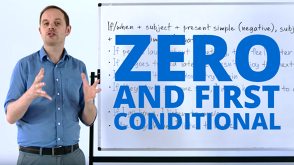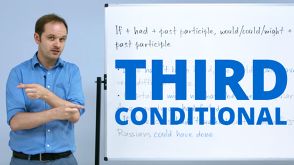Learn real English from movies and books.
Add words or phrases for learning and practice with other learners.
-
STEP 1Watch the video

-
STEP 2Do the exercises

-
STEP 3Add phrases you like to Favorites

Second Conditional
- 00:00 / 00:00
Click on a word or highlight a phrase to see translation
Click on a word or highlight a phrase to see translation
Click "plus" to add word/phrase for learning
Click "plus" to add word/phrase for learning
Start learning
Start learning
Second conditional: unreal situations
We can use ‘if' sentences to talk about general truths (the ‘0 conditional') as well as future possibilities (‘the 1st conditional'). When we want to talk about hypothetical, imaginary or ‘unreal' situations in the present or future we use another form of ‘if' sentences called the 2nd conditional
If + subject + past simple/continuous + object , would/could/might + bare infinitive
|
‘If' clause |
Main clause |
Explanation |
|
If I had a million dollars, |
I would buy a house |
This person does not have a million dollars at the moment but in an imaginary situation when they did, they would buy a house. |
|
If I wasn't a teacher, |
I would be an actor |
This person is a teacher but they use the second conditional to talk about their present situation could be different. |
|
If he was working on a farm, |
he would be very unhappy |
This person is not working on a farm and they use the second conditional to describe their mood if, in a hypothetical situation, they did. |
Second conditional: describing the consequences
In order to change the way we describe the meaning of the ‘main clause' in the second conditional sentences we can use ‘would' which is more common, ‘could', to talk about possibility and ‘might' to describe general uncertainty.
‘If' clause |
Main clause |
Explanation |
|
If he had a job, |
he would be happier |
A man does not have a job but hypothetically if he did he would be happier in his life |
|
If politicians were honest, |
the world could be better |
There is a stronger possibility of a better world in an imaginary world where politicians are honest |
|
If my boss gave me less work, |
I might write a novel |
In the unlikely situation of getting less work, this man may (or may not) write a novel |
Warning!
It's important to remember NOT to put the modal verb (‘would', ‘could' or ‘might') in the conditional or ‘if' clause when using conditional sentences:
- If I had time, I would do interesting things (NOT If I would have time I would do interesting things)
Flexibility in conditional sentences
Conditional sentences are flexible, you can swap the ‘if clause' with the second clause and the meaning does not change and you can do this with all conditional sentences. Note that the comma (,) is lost when we swap the clauses:
-
If people relaxed more, they would feel better = People would feel better if they relaxed more
-
If he played better, I wouldn't get angry = I wouldn't get angry if he played better
Second conditional - question forms
Note the change in word order when you make questions with the second conditional
-
What would you do if you weren't in prison?
-
If he wasn't so lazy, what would he be doing with this life?
-
What would you look like if you didn't have a big beard?
-
If Britain was warmer, would you be able to live there?
-
Would you dance more if you liked the music?
Similar video exercises
Click on a word or highlight a phrase to see translation
Click on a word or highlight a phrase to see translation
Click "plus" to add word/phrase for learning
Click "plus" to add word/phrase for learning




